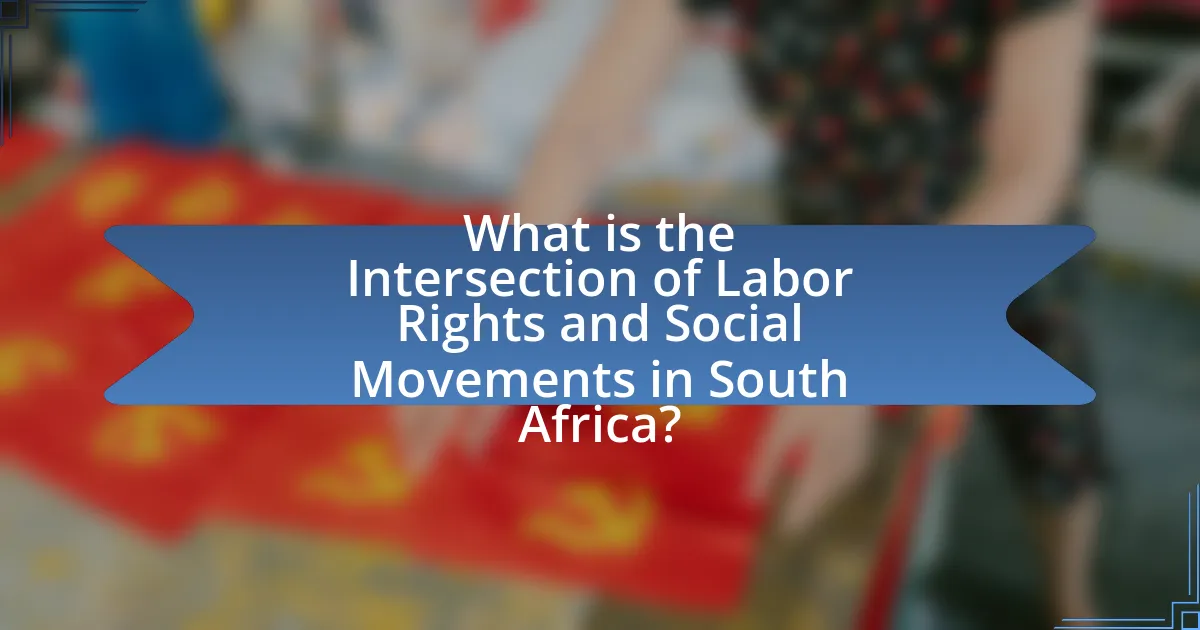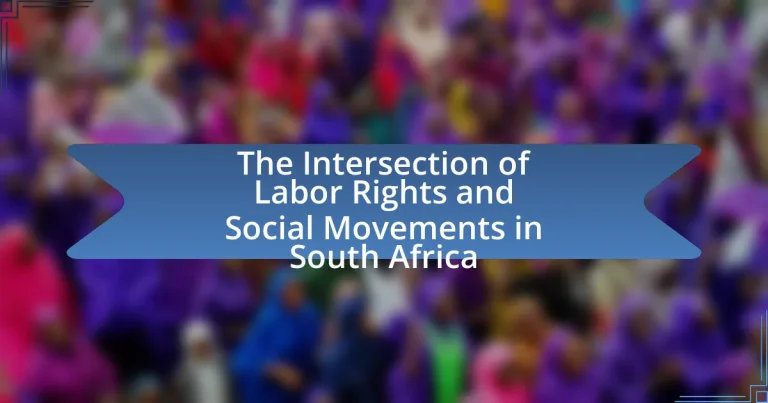The article examines the intersection of labor rights and social movements in South Africa, highlighting the historical context of labor struggles, particularly during and after apartheid. It discusses the role of significant labor movements, such as the Congress of South African Trade Unions (COSATU), in advocating for workers’ rights and their alignment with broader social justice issues. Key legislative frameworks, including the Labour Relations Act and the Basic Conditions of Employment Act, are analyzed for their impact on labor rights. The article also explores contemporary challenges faced by labor movements, the significance of social activism, and the future prospects for labor rights advocacy in the context of ongoing economic inequality and technological advancements.

What is the Intersection of Labor Rights and Social Movements in South Africa?
The intersection of labor rights and social movements in South Africa is characterized by a historical struggle for equitable working conditions and social justice, particularly during and after the apartheid era. Labor movements, such as the Congress of South African Trade Unions (COSATU), have played a crucial role in advocating for workers’ rights, including fair wages and safe working environments, while also aligning with broader social movements that address issues like racial inequality and economic disparity. For instance, the 1987 miners’ strike highlighted the connection between labor rights and anti-apartheid activism, demonstrating how labor struggles were integral to the fight for democracy and social change in South Africa. This synergy continues today, as labor unions engage in social activism to combat poverty and promote human rights, reflecting the ongoing relevance of labor rights within the broader context of social movements in the country.
How have historical events shaped labor rights in South Africa?
Historical events have significantly shaped labor rights in South Africa, particularly through the impact of apartheid and subsequent democratic reforms. The apartheid regime, which lasted from 1948 to the early 1990s, enforced racial segregation and discrimination, severely limiting the rights of black workers and denying them basic labor protections. The establishment of the Industrial Conciliation Act in 1956 exemplified this, as it excluded black workers from union representation and collective bargaining.
The struggle against apartheid, marked by significant events such as the 1976 Soweto Uprising and the formation of powerful trade unions like the Congress of South African Trade Unions (COSATU) in 1982, galvanized the labor movement. These movements highlighted the need for equitable labor rights and led to increased organization among workers. The eventual end of apartheid in 1994 resulted in the adoption of the Labor Relations Act, which aimed to promote fair labor practices and protect the rights of all workers, regardless of race.
The transition to democracy also saw the establishment of the Commission for Conciliation, Mediation and Arbitration (CCMA) in 1996, which further strengthened labor rights by providing mechanisms for dispute resolution. Thus, historical events, particularly the anti-apartheid struggle and subsequent legislative reforms, have fundamentally transformed labor rights in South Africa, ensuring greater protections and representation for workers.
What key legislation has influenced labor rights in the country?
The key legislation that has influenced labor rights in South Africa includes the Labour Relations Act of 1995, which established the framework for collective bargaining and the right to strike. This act was pivotal in promoting fair labor practices and protecting workers’ rights post-apartheid. Additionally, the Basic Conditions of Employment Act of 1997 set minimum standards for working conditions, including hours of work, leave, and remuneration, further enhancing labor rights. These legislative measures were crucial in addressing historical injustices and empowering workers within the South African labor market.
How did apartheid impact labor movements and rights?
Apartheid severely restricted labor movements and rights in South Africa by enforcing racial segregation and discriminatory laws that marginalized non-white workers. The apartheid regime implemented policies that limited the rights of black workers to organize, strike, and negotiate for better wages and working conditions, effectively suppressing their ability to advocate for labor rights. For instance, the Industrial Conciliation Act of 1956 excluded black workers from trade unions and collective bargaining, which stifled their representation in the labor market. This systemic oppression led to the formation of underground unions and resistance movements, such as the Congress of South African Trade Unions (COSATU) in the 1980s, which played a crucial role in the anti-apartheid struggle and eventually contributed to the establishment of more equitable labor rights post-apartheid.
What role do social movements play in advocating for labor rights?
Social movements play a crucial role in advocating for labor rights by mobilizing collective action, raising awareness, and influencing policy changes. In South Africa, movements such as the Congress of South African Trade Unions (COSATU) have historically organized strikes and protests to demand better wages and working conditions, significantly impacting labor legislation. For instance, the 2012 Marikana miners’ strike highlighted the urgent need for improved labor rights and led to national discussions on worker safety and compensation. These movements not only amplify the voices of workers but also hold corporations and the government accountable, fostering a more equitable labor environment.
How do social movements mobilize support for labor rights?
Social movements mobilize support for labor rights by raising awareness, organizing collective action, and advocating for policy changes. In South Africa, movements such as the Congress of South African Trade Unions (COSATU) have effectively utilized strikes, protests, and public campaigns to highlight labor injustices and demand better working conditions. For instance, the 2012 Marikana miners’ strike, which resulted in significant media coverage and public sympathy, exemplified how mobilization can draw attention to labor rights issues. This collective action not only galvanizes community support but also pressures policymakers to address labor concerns, thereby reinforcing the importance of social movements in advancing labor rights.
What strategies do social movements use to influence policy?
Social movements use various strategies to influence policy, including grassroots mobilization, advocacy campaigns, coalition building, and legal action. Grassroots mobilization involves organizing community members to participate in protests, demonstrations, and public forums, which raises awareness and puts pressure on policymakers. Advocacy campaigns utilize media and communication strategies to highlight specific issues, aiming to sway public opinion and garner support from influential stakeholders. Coalition building among different organizations amplifies voices and resources, creating a united front that can more effectively lobby for policy changes. Legal action, such as filing lawsuits or supporting legislative initiatives, directly challenges existing laws or seeks to establish new legal precedents that align with the movement’s goals. These strategies have been evidenced in South Africa, where labor rights movements have successfully influenced policies through organized strikes and negotiations, demonstrating the effectiveness of these approaches in achieving social change.
Why is the intersection of labor rights and social movements significant in South Africa?
The intersection of labor rights and social movements is significant in South Africa because it has historically driven social change and economic justice. Labor movements, particularly during the anti-apartheid struggle, mobilized workers to advocate for better wages, working conditions, and political rights, exemplified by the formation of the Congress of South African Trade Unions in 1981. This coalition not only fought for labor rights but also aligned with broader social movements, emphasizing the interconnectedness of economic and social justice. The legacy of these movements continues to influence contemporary struggles against inequality and exploitation in South Africa, highlighting the ongoing relevance of labor rights in the fight for social equity.
What are the implications for workers’ rights and social justice?
The implications for workers’ rights and social justice in South Africa are significant, as they directly influence the ability of workers to secure fair wages, safe working conditions, and equitable treatment. The historical context of apartheid has led to systemic inequalities that persist today, affecting labor relations and social justice movements. For instance, the 2012 Marikana massacre highlighted the struggles of mine workers advocating for better pay and conditions, resulting in increased awareness and mobilization around labor rights. Furthermore, the South African Constitution guarantees the right to fair labor practices, yet enforcement remains inconsistent, illustrating the ongoing challenges in achieving true social justice for workers.
How does this intersection affect economic inequality in the country?
The intersection of labor rights and social movements in South Africa exacerbates economic inequality by limiting access to fair wages and job security for marginalized workers. Historical data shows that labor movements have often struggled against systemic barriers, resulting in a persistent wage gap; for instance, the average wage for black workers remains significantly lower than that of their white counterparts, with a disparity of approximately 30% as reported by the South African Labour Force Survey. Additionally, social movements advocating for labor rights have faced repression, which undermines their effectiveness in addressing these inequalities. This dynamic perpetuates a cycle where economic benefits are concentrated among a small elite, while the majority of workers remain trapped in low-paying, unstable jobs, further entrenching economic disparities in the country.
How do contemporary social movements address labor rights issues?
Contemporary social movements address labor rights issues by advocating for fair wages, safe working conditions, and the right to organize. These movements, such as the South African Federation of Trade Unions, mobilize workers to demand legislative changes and hold corporations accountable for labor practices. For instance, the 2012 Marikana miners’ strike highlighted the struggle for better wages and working conditions, resulting in increased awareness and dialogue around labor rights in South Africa. Additionally, social movements utilize digital platforms to amplify their messages, engage a broader audience, and coordinate protests, thereby enhancing their impact on labor rights advocacy.
What challenges do labor rights movements face today?
Labor rights movements in South Africa today face significant challenges, including government repression, economic inequality, and the rise of gig economy jobs. Government repression manifests through restrictive labor laws and crackdowns on protests, which hinder the ability of movements to organize and advocate effectively. Economic inequality exacerbates the struggle for fair wages and working conditions, as many workers remain in precarious employment situations. Additionally, the rise of gig economy jobs has led to a lack of job security and benefits for workers, complicating traditional labor organizing efforts. These factors collectively undermine the effectiveness and reach of labor rights movements in advocating for workers’ rights in the current socio-economic landscape.

What are the key components of labor rights in South Africa?
The key components of labor rights in South Africa include the right to fair wages, the right to safe working conditions, the right to join trade unions, and the right to collective bargaining. These rights are enshrined in the Constitution of South Africa and are further supported by the Labour Relations Act, which promotes fair labor practices and protects workers from unfair dismissal. Additionally, the Basic Conditions of Employment Act establishes minimum standards for working hours, leave, and remuneration, ensuring that workers are treated with dignity and respect.
What rights are guaranteed to workers under South African law?
Workers in South Africa are guaranteed several rights under the Constitution and labor laws, including the right to fair labor practices, the right to join trade unions, the right to collective bargaining, and the right to equal pay for equal work. The Labour Relations Act of 1995 specifically protects these rights, ensuring that workers can engage in collective action and negotiate terms of employment without fear of discrimination or retaliation. Additionally, the Basic Conditions of Employment Act establishes minimum standards for working conditions, such as working hours, leave entitlements, and remuneration, reinforcing the legal framework that safeguards workers’ rights in South Africa.
How do these rights compare to international labor standards?
Labor rights in South Africa are generally aligned with international labor standards, particularly those set by the International Labour Organization (ILO). South Africa’s Constitution guarantees fundamental labor rights, including the right to fair wages, safe working conditions, and the right to organize, which are consistent with ILO conventions such as Convention No. 87 on Freedom of Association and Protection of the Right to Organize. Additionally, South Africa has ratified several ILO conventions that promote decent work and social justice, reinforcing its commitment to uphold these international standards. However, challenges remain in enforcement and compliance, which can lead to discrepancies between the rights on paper and the actual conditions experienced by workers.
What protections exist against unfair labor practices?
Protections against unfair labor practices in South Africa are primarily provided by the Labour Relations Act of 1995, which establishes the rights of employees and employers. This legislation prohibits unfair dismissal, discrimination, and other forms of unfair treatment in the workplace. Additionally, the Commission for Conciliation, Mediation and Arbitration (CCMA) serves as an independent body that resolves disputes between employers and employees, ensuring that workers can seek redress for unfair labor practices. The Basic Conditions of Employment Act also sets minimum standards for working conditions, further safeguarding employees’ rights. These legal frameworks collectively create a robust system of protections against unfair labor practices in South Africa.
How do labor unions contribute to the protection of labor rights?
Labor unions contribute to the protection of labor rights by advocating for fair wages, safe working conditions, and equitable treatment of workers. They engage in collective bargaining, which allows workers to negotiate terms of employment collectively, thereby strengthening their position against employers. For instance, in South Africa, unions like the Congress of South African Trade Unions (COSATU) have played a crucial role in securing labor rights through strikes and negotiations, resulting in improved labor laws and protections. Historical data shows that union-led initiatives have led to significant legislative changes, such as the Basic Conditions of Employment Act, which established minimum standards for working conditions.
What role do unions play in collective bargaining?
Unions serve as the primary representatives of workers in collective bargaining, negotiating terms of employment such as wages, benefits, and working conditions on behalf of their members. They leverage collective power to enhance the bargaining position of workers against employers, ensuring that their voices are heard in the negotiation process. For instance, in South Africa, unions like the Congress of South African Trade Unions (COSATU) have historically played a crucial role in advocating for labor rights, influencing policies that affect workers’ livelihoods and contributing to social movements aimed at improving economic conditions. This representation is vital as it enables workers to achieve better outcomes than they might individually, demonstrating the effectiveness of organized labor in collective negotiations.
How have unions evolved in response to social movements?
Unions in South Africa have evolved significantly in response to social movements by increasingly aligning their objectives with broader social justice issues. Historically, unions initially focused on labor rights and workplace conditions; however, the anti-apartheid movement in the 1980s prompted unions to adopt a more holistic approach that included fighting for racial equality and human rights. For example, the Congress of South African Trade Unions (COSATU) played a crucial role in mobilizing workers against apartheid, demonstrating how unions can integrate social movements into their agendas. This evolution continued post-apartheid, as unions began addressing issues such as gender equality, environmental justice, and economic inequality, reflecting the diverse concerns of contemporary social movements. The shift illustrates that unions have become more than just labor organizations; they now serve as platforms for broader societal change, reinforcing their relevance in a changing socio-political landscape.

What are the future prospects for labor rights and social movements in South Africa?
The future prospects for labor rights and social movements in South Africa appear to be increasingly intertwined with the country’s socio-economic challenges and political landscape. As unemployment rates remain high, currently around 34%, and inequality persists, labor movements are likely to gain momentum in advocating for better working conditions and fair wages. Historical context shows that significant labor strikes, such as the 2012 Marikana miners’ strike, have catalyzed social movements, highlighting the ongoing struggle for workers’ rights. Additionally, the rise of digital activism and social media platforms is expected to enhance the visibility and organization of labor movements, allowing for broader participation and solidarity among various social groups. This evolution suggests that labor rights and social movements will continue to play a crucial role in shaping South Africa’s socio-political future.
How can social movements adapt to changing labor landscapes?
Social movements can adapt to changing labor landscapes by embracing digital organizing tools and forming coalitions with diverse stakeholders. The rise of technology in the workplace necessitates that movements utilize social media and online platforms to mobilize support, disseminate information, and coordinate actions effectively. For instance, the South African labor movement has increasingly leveraged platforms like Twitter and Facebook to engage younger workers and raise awareness about labor rights issues. Additionally, forming alliances with environmental and social justice groups can broaden the scope of advocacy, allowing movements to address interconnected issues such as economic inequality and climate change, which are increasingly relevant in today’s labor discussions. This adaptability is crucial as it enables social movements to remain relevant and effective in advocating for workers’ rights amidst evolving economic conditions.
What innovations are emerging in labor rights advocacy?
Innovations emerging in labor rights advocacy include the use of digital platforms for organizing and mobilizing workers, as well as the integration of artificial intelligence to analyze labor market trends and worker conditions. Digital platforms, such as social media and dedicated apps, facilitate real-time communication and coordination among workers, enhancing their ability to advocate for rights and negotiate better conditions. For instance, the rise of online petitions and crowdfunding campaigns has empowered workers to gain support for their causes more effectively. Additionally, AI tools are being utilized to gather data on labor violations, enabling advocates to present compelling evidence to policymakers and the public. These innovations reflect a shift towards more technology-driven approaches in labor rights advocacy, allowing for greater engagement and impact in the fight for workers’ rights.
How can technology enhance the effectiveness of social movements?
Technology enhances the effectiveness of social movements by facilitating communication, mobilization, and awareness. Social media platforms enable rapid dissemination of information, allowing movements to reach a wider audience quickly; for instance, the #FeesMustFall movement in South Africa utilized Twitter to organize protests and share updates, resulting in significant public engagement and media coverage. Additionally, technology provides tools for data collection and analysis, which can help movements track their impact and strategize effectively. The use of mobile applications for organizing events and fundraising has also proven crucial in sustaining momentum and resources for social movements.
What best practices can be adopted for effective advocacy in labor rights?
Effective advocacy in labor rights can be achieved through strategic coalition-building, grassroots mobilization, and leveraging legal frameworks. Coalition-building allows diverse stakeholders, including unions, NGOs, and community organizations, to unite for a common cause, enhancing influence and reach. Grassroots mobilization engages workers directly, empowering them to voice their concerns and participate actively in advocacy efforts. Utilizing legal frameworks, such as international labor standards and national labor laws, provides a solid foundation for claims and actions, ensuring that advocacy efforts are grounded in recognized rights. For instance, the International Labour Organization’s conventions serve as critical references for advocating labor rights, reinforcing the legitimacy of the movement.


